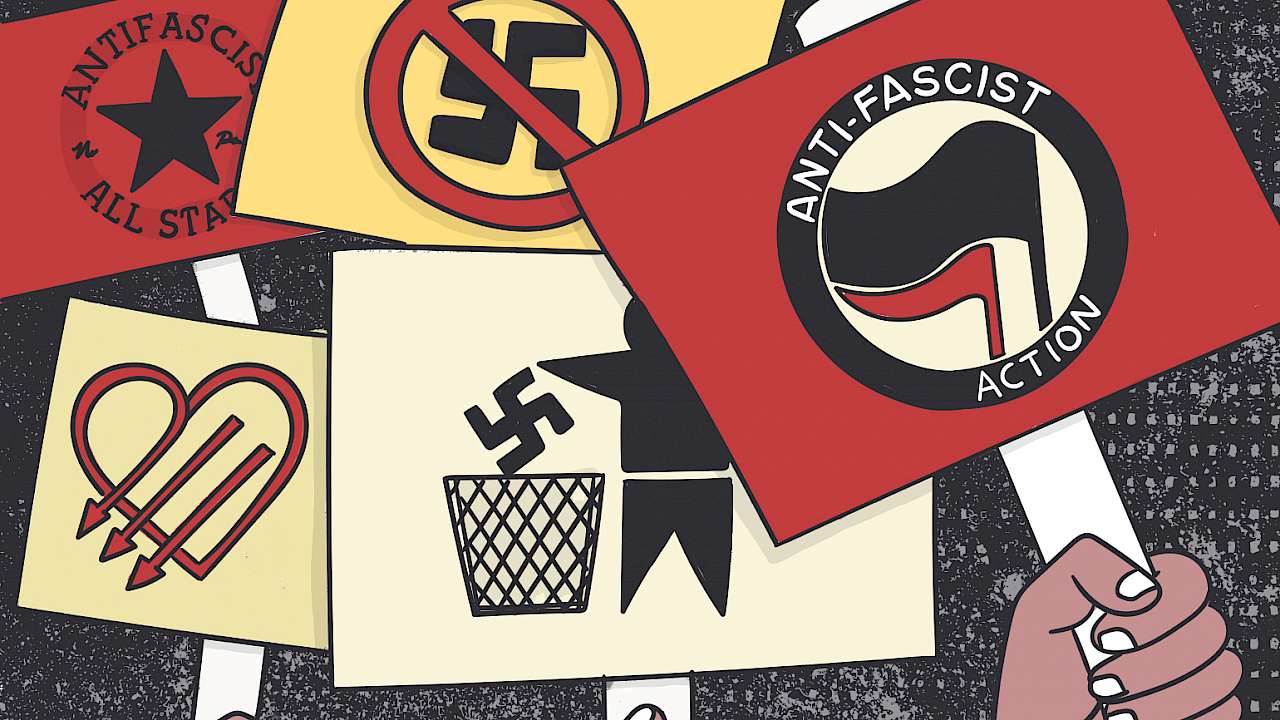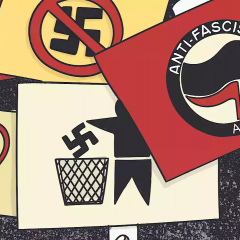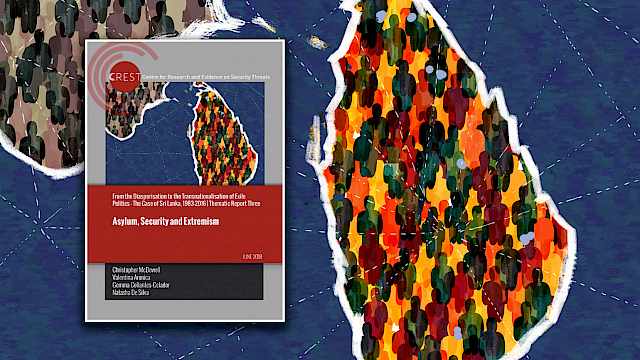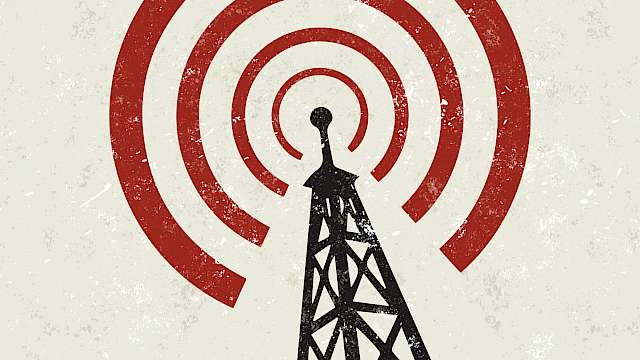Introduction
Anti-fascist militancy has existed for as long as fascism has, but militant anti-fascism is still largely neglected across both academic and policy-practitioner communities. A far more robust, evidence-based understanding is now needed, especially in a context where militant anti-fascist protest in the United States has been conflated with ‘domestic terrorism’.
The militant anti-fascist movement, or Antifa, is a de-centralised, non-hierarchical social movement. It is loosely structured on dispersed networks of local groups. It has a distinctly anti-authoritarian orientation, consisting, for the most part, of anarchists; anarcho-communists; left-libertarians; and radical socialists. The movement is transnational, but it responds in local conditions.
This report presents evidence from six local case studies: three from the United States: Portland, New York City, Philadelphia; and three from Britain: Brighton, Liverpool, London. It adopts a multi-method approach, combining interviews with anti-fascist activists drawn from these six localities as well as analysis of digital platforms used by local militant anti-fascist groups (Rose City Antifa; NYC Antifa; Philly Antifa; Brighton Antifascists; Merseyside Anti-Fascist Network; and London Antifascists).
Conclusions
The following conclusions are drawn:
- Militant anti-fascists are not wedded to a narrow definition of fascism, but they do believe that fascism is qualitatively different from all other forms of politics in that it is exceptional in its threat and use of violence.
- Militant anti-fascists do not see ‘fascism’ everywhere and generally retain their focus on the political space which is commonly understood by the mainstream society as ‘far right’.
- Militant anti-fascists share a common commitment to the principles of ‘no platform’, whereby individuals holding views regarded as ‘fascist’ or ‘fascistic’ should be prevented from contributing to public debate ‘by whatever means necessary'.
- Militant anti-fascists also share a commitment to ‘direct action’, whereby anti-fascist actors use their own power to directly reach their goals rather than appeal to the authorities.
- While the willingness to use confrontational violence separates militant anti-fascism from non-militant forms, militant anti-fascists exercise restraint in their use of violence. This is significant. It clearly challenges simplistic associations with terrorism and the planning of terrorist acts and/or mass violence that threatens life. The claim that fascism is defined by an ultra-violent credo imposes a value-based, prefigurative boundary on militant anti-fascists in both their use and rhetorical representation of violence. Strategic concerns factor too, such as the risk that violent escalation will lead either to group isolation from the wider anti-fascist coalition or dissolution as a result of increasing state repression. Internal cultures of decision-making and recruitment structures function as further dynamics of restraint (or internal brakes, as suggested in previous CREST research).
Militant anti-fascists exercise restraint in their use of violence
- The aforementioned conclusions are borne out with regards to not only the street activism of militant anti-fascist groups but also their digital activism. On their websites, blogs and social media accounts, the form of ‘direct action’ most commonly engaged in by anti-fascist groups is ‘doxing’: publicising information about far-right activists in the hope that this will result in legal or economic consequences for the individual. These digital platforms also offer the opportunity for different groups to forge networks. However, these networks are largely solidaristic rather than organisational in nature (both within their own national settings and trans-nationally).
- The respective histories of militant anti-fascism in both the US and Britain reveal a long-term trend towards promoting greater public participation at protest events. However, there remains an obvious tension between broadening the base of opposition to ‘fascism’ and retaining group coherence and militancy. Nonetheless, the direction of travel is not towards the formation of clandestine, underground cells. There is little evidence of a push towards the escalation of violence from non-lethal to lethal, or the adoption of a modus operandi that is more typically associated with terrorist groups.
- Anti-fascism is reactive, and its defensive response is shaped by the nature of the perceived threat. In terms of public order risk assessment, context is critical. In the US, following the election of Donald Trump in 2016, a conflict between anti-fascists and the far right attracted an international profile, and the demonisation of Antifa as ‘domestic terrorists’ bent on sowing chaos and disorder, encouraged each side to define one another in terms of an existential threat. During 2020, this polarisation further deepened with the pandemic, the killing of George Floyd, excessive use of law enforcement, and Trump’s rejection of the presidential election result as fraudulent. The presence of armed individuals on protests is a further context-specific aggravating factor.
- In Britain, while society polarised over Brexit, the pandemic dampened down far-right street mobilisation, and while anti-fascists remain pessimistic regarding future developments, the far right is not currently considered an existential threat. Unlike the US, the militant anti-fascist movement is rarely discussed in this country in relation to public debates on ‘violent extremism’. It is not subject to the same levels of disinformation, rumour, hysteria, and moral panic that could trigger vigilante action by the far right, and in turn, encourage more militant responses.
- On both sides of the Atlantic, the most likely risk in terms of the escalation of violence from the sub-lethal to lethal rests with impressionable individuals imbibed with anti-fascism’s de-humanisation of the far right. This is the individual who might lack the framework of restraint, who might only loosely associate with a militant anti-fascist group, and who is motivated entirely by their hostile response to ‘fascism’ as an egregious and abhorrent injustice.
- This is a reactive mindset, which requires a stimulus, whether coming from the provocation of the far right directly through aggressive displays of force (e.g. a pro-Trump protest where paintballs are shot from the beds of pickups), or by government policies (e.g. immigration raids and detention centres). This threshold has been reached in the US. In Britain, however, for the moment such stimuli remain less likely. It will probably require a deeply polarising event, or series of events, to trigger an impressionable individual to seek recourse to lethal violence as a way of venting their anger at perceived ‘fascist’ injustice.
Risk matrix
The following matrix is a risk projection for the next two to three years. It is based on the assumption that Britain’s far right will return to the streets in significant numbers following the end of the pandemic.
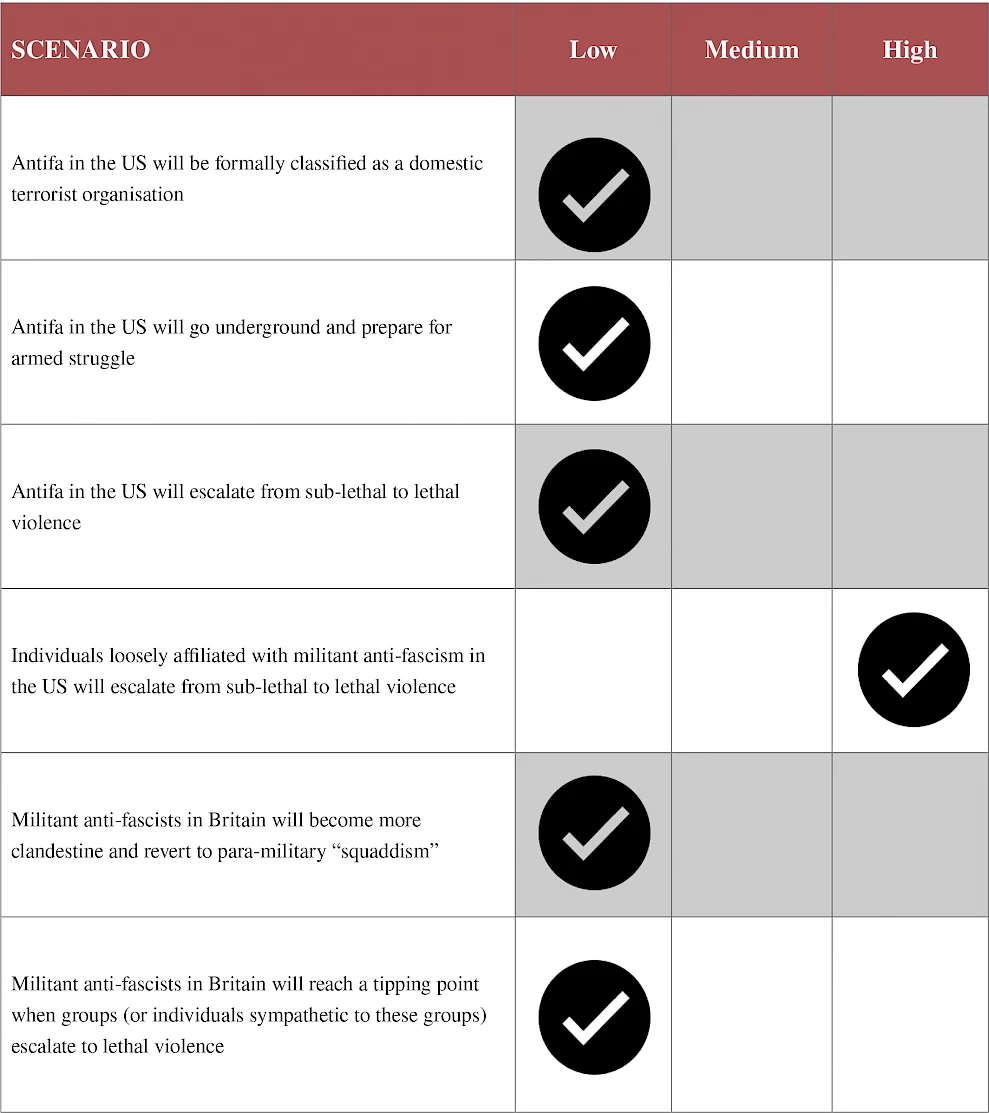
Read more
- AFN. (2013, September 10). London Antifascists. Retrieved from https://londonantifascists.wordpress.com/2013/09/10/afn-press-release-on-the-arrests-of-anti-fascists-in-tower-hamlets/
- Anon. (2006). libcom.org. Retrieved from https://libcom.org/history/1985-2001-anti-fascist-action-afa
- Anon. (2013, September 22). Retrieved from While Rome Burns: An Anarchist journal: https://whileromeburnsjournal.wordpress.com
- Anon. (2018, June 14). Anti-Fascist Network. Retrieved from https://antifascistnetwork.org/2018/06/14/the-far-right-threat-is-getting-more-dangerous-we-need-to-act/#more-4400
- Anon. (2019). From Antiglobe to Antifa: A Recent History of Anarchist Struggle in NYC
- Antifa. (2004). Retrieved from http://www.antifa.org.uk/About us.html
- Antifa. (2008, Summer Issue 70). Bash the Fash. Organise! for revolutionary anarchism
- Antifa Action Statement. (n.d.). Antifa Action Statement. Retrieved from antifa.org: http://www.antifa.org.uk/statement.html
- Antifa. (n.d.). Bash the Fash: An Introduction to Antifa
- Antifa, N. (n.d.). NYC Antifa
- Antifa, Philly; Antifa, NYC. (2016, November 26). ‘What Do U.S. Anti-Fascists Actually Believe? A Reply To ‘On Antifa: Some Critical Notes’’. Retrieved from It's Going Down: https://itsgoingdown.org/u-s-antifascists-actually-believe-reply-antifa-critical-notes
- Anti-Fascist Action. (1996). ‘Stoned by the Mersey’. Fighting Talk, Issue 13, 20–21
- Anti-Fascist Network. (2013). Anti-Fascist Nework, Join Us Flyer
- Anti-Fascist Network. (2013). ‘Why take direct action against fascism?’
- ARA-LA/PART. (2009, Spring v. 22, no. 2). ‘The Anti-Racist Movement, the ARA Phenomenon, and the Anti-Racist Action Network’. Turning the Tide. Culver City, CA: Anti-Racist Action Publishers
- ARA-LA/PART. (2014, Jan-March ). ‘Torch, An Antifascist Network’. Turning the Tide. Culver City, CA: Anti-Racist Action Publishers
- Assael, S., & Keating, P. (2019, November 3). ‘The Massacre That Spawned the Alt Right’ Politicomagazine
- BAF01. (2020, August 12). (N. Copsey, Interviewer)
- Barrot, J. (2001). Fascism/Anti-Fascism. London: BM Active
- Bevensee, E. (2017). Towards a Transformative Anti-Fascism. Retrieved from https://emmibevensee.com/?p=415
- Bevensee, E. (2019). ‘Determining a Threat When Your're the Target: A Response to Several Authors’. In J. Tuttle (ed.), Fighting Fascism (pp. 409–425). C4SS
- Bray, M. (2017). Antifa: The Anti-Fascist Handbook. London: Melville House
- Brighton & Hove City Council. (2014). Brighton and Hove City Snapshot: Report of Statistics 2014. Brighton: Brighton & Hove City Council
- Brighton Antifascists. (2020, February 24). Brighton Antifascists. Retrieved from ‘Exclusive Interview with the Amazing Rose City Antifa’: https://brightonantifascists.com/2020/02/24/exclusive-interview-with-the-amazing-rose-city-antifa
- Bristol Antifascists. (2018, February 27). Retrieved from https://network23.org/bristolantifascists/2018/02
- Bristol Antifascists. (n.d.). Zero Tolerance of Fascism. Leaflet
- Brown, S. (No 3, Fall 2002, Fall). ‘Anarchist History! The Revolutionary Anarchist Bowling League’ (RABL). Daybreak! (midwestern anarchism), 6
- Burley, S. (2017). Fascism Today: What it is and How to end it. Edinburgh: AK Press
- Burley, S. (2019, July 4). Salon. Retrieved from https://www.salon.com/2019/07/04/patriot-prayer-is-building-a-violent-movement-in-portland_partner
- Busher, J., Holbrook, D., & Macklin, G. (2019) ‘The Internal Brakes on Violent Escalation: A Descriptive Typology’ (Lancaster: CREST)
- Byas, J. L. (2019). ‘Holding our Ground: A Critique of the Ethics & Strategy of Violence against Fascist Assembly’. In J. Tuttle (ed.) Fighting Fascism (pp. 255–274). C4SS
- Cider Riot v Patriot Prayer Complaint (Circuit Court for the Satte of Oregon for the County of Multnomah May 3, 2019)
- City of Portland. (2018, October 24). Retrieved from https://www.portlandmercury.com/images/blogimages/2018/11/09/1541788937-protest_safety_ordinance.pdf
- Clark, R. (2018, December 20). OpenDemocracy.net. Retrieved from ‘How scousers see off the fascists’: https://www.opendemocracy.net/en/opendemocracyuk/how-scousers-see-off-fascists/
- Copsey, N. (2010). The English Defence League: Challenging our Country and Our Values of Social Inclusion, Fairness and Equality. London: Faith Matters
- Copsey, N. (2011). ‘From direct action to community action: The changing dynamics of anti-fascist opposition’. In N. Copsey, & G. Macklin (eds), British National Party: Contemporary Perpectives. Abingdon: Routledge
- Copsey, N. (2017). Anti-Fascism in Britain. Abingdon: Routledge
- Copsey, N. (2018, May/June). ‘Militant Antifascism: An Alternative (Historical) Reading’. Society, pp. 243–247
- Copsey, N. and Merrill, S. (2020) ‘Violence and Restraint within Antifa: A View from the United States’, Perspectives on Terrorism, Volume 14, No. 6, 122-138.
- CrimethInc. (2017). Not Your Grandfather's Antifascism: Anti-Fascism Has Arrived. Here's Where it Needs to Go,
- CrimethInc. (2020, August 13). Retrieved from CrimethInc.: https://crimethinc.com/2017/03/14/direct-action-guide
- CrimethInc. Workers' Collective. (2017). Recipes for Disaster: An Anarchist Cookbook. Salem, OR
- Dickens, P. (2013, January 5). ‘Why no platform is still relevant, and the trouble with liberal ‘anti-fascism’’. Retrieved from libcom.org: https://libcom.org/blog/why-no-platform-still-relevant-trouble-liberal-anti-fascism-05012013
- DSA01. (2019, October 31). (N. Copsey, Interviewer)Enzinna, W. (2017, May/June). 'This is a War and We Intend to Win'. Retrieved from Mother Jones: https://www.motherjones.com/politics/2017/04/anti-racist-antifa-tinley-park-five/
- Falciola, L. (2003) ‘Pathways of an Early De-Escalation from Anti-Personnel Violence: The Case of the Weather Underground’. ECPR Conference Paper, Sciences Po, Bordeaux
- Forming An Antifa Group: A Manual. (2017, February 16). Retrieved from (MACC01, 2020) https://itsgoingdown.org/wp-content/uploads/2017/02/howtoantifa-revised.pdf
- Gal, H. (2019). ‘Joyful militancy: on the founding of the Feminist Anti-Fascist Assembly’. In RS21, The New Far Right & How to Fight It (pp. 28–32)
- Gilles, W. (2019). ‘Antifa Activists as the Turest Defenders of Feee Speech’. In J. Tuttle (ed.), Fighting Fascism: Anti-fascism, Free Speech & Political Violence (pp. 185–254). C4SS
- Greenstein, T. (2011). The Fight Against Fascism in Brighton and the South Coast. Brighton: Brighton History Workshop
- Hayes, M. (2017). ‘Red Action – Left Wing Political Pariah’. In E. Smith, & M. Worley (eds), Against the Grain: The British Far Left from 1956. Manchester: Manchester University Press
- Hummel, T. (2019, November 22). Marx21. Retrieved from https://marx21us.org/2019/11/22/the-proud-boys-come-to-nyc-everyday-anti-fascists-shut-them-down/
- Idavox. (2016, December 30). Retrieved from http://idavox.com/index.php/2016/12/30/breaking-gavin-mcinnes-is-threatening-to-crash-bands-show-in-brooklyn-tonight/
- Inman. (2019, May 26). ‘Community Self Defense Post-Charlottesville-2017’. (F. S. Podcast, Interviewer)
- Intelligence Fusion. (2020). Threat Assessment: Antifa and their activity in Portland and Seattle
- It's Going Down. (2018, July 25). ‘Antifa in the UK: Growing a Movement in An Age of Far-Right Riots’. Retrieved from https://itsgoingdown.org/antifa-in-the-uk-growing-a-movement-in-an-age-of-far-right-riots
- Jenkins, D. L. (2020, May 25). email to author. (N. Copsey, Interviewer)
- Johnstone, D. (2019). ‘The United States is Experiencing a Major Political Crisis and Antifa is Mathing Things Worse’. In E. Doyle (ed.), Antifa and the Radical Left (pp. 103–109). New York: Greenhaven Publishing
- Kelly, K. (2020, June 4). ‘Stop blaming everything bad on anarchists’. Washington Post
- Kenney, M., & Clarke, C. (2020, June 23). ‘What antifa is, what it isn't, and why it matters’. Retrieved from War on the Rocks: https://warontherocks.com/2020/06/what-antifa-is-what-it-isnt-and-why-it-matters
- Knouff, M. (2007). An Outsider's Guide to Antifa, Volume 1
- LAF01. (2020, August 27). (N. Copsey, Interviewer)
- Langer, E. (2003). A Hundred Little Hitlers: The Death of a Black Man, The Trial of a White Racist, and the Rise of the Neo-Nazi Movement in America. New York: Picador
- Leeds Antifascist Network. (2020, March 1). ‘Leeds Antifascist Network: Vision and Mission for 2020’. Retrieved from https://leedsantifascists.wordpress.com/?fbclid=IwAR2tw4uA70wVp8VGoD_DxLWt7jt1F3ribgxljOcHVCxtMgt2p-88bMboBDw
- Lennard, N. (2019). Being Numerous: Essays on Non-Fascist Life. New York: Verso
- London Antifascists. (n.d.). About. Retrieved from London Antifascists: https://londonantifa.home.blog/about-us
- London Antifascists. (n.d.). London Antifascists. Retrieved from https://londonantifascists.wordpress.com/about
- Lucas, R. (2020, September 5). NPR. Retrieved from NPR.org: https://www.npr.org/2020/09/05/909245646/review-of-federal-charges-in-portland-unrest-show-most-are-misdemeanors?t=1600423612805
- Lyons, R. (2008, September 3). ‘Antifa's Gift to the BNP.’ The Guardian
- Macklin, G. (2018). ‘Only Bullets will Stop Us! The Banning of National Action.’ Perspectives on Terrorism, Vol. 12., Issue 6., 104–122
- MACC01. (2020, September 8). (N. Copsey, Interviewer)
- MAFN01. (2020, July 30). (N. Copsey, Interviewer)
- McGowan, R. (2003, July 22). Claim No Easy Victories: An Analysis of Anti-Racist Action and its Contributions to the Building of a Radical Anti-Racist Movement. Retrieved from The Northeastern Anarchist: http://nefac.net/node/523
- McHugh, A. (2019). ‘A Meditation on Violence’. In J. Tuttle (ed), Fighting Fascism (pp. 343–359). C4SS
- Merrill, S. (2020, July 19). Data Set 1
- Merrill, S. and Pries, J. (2019), ‘Translocalising and Relocalising Antifascist Struggles: From #KämpaShowan to #KämpaMalmö’. Antipode, 51: 248–270
- Mesh, A. (2019, August 17). Portland Mayor Responds to Right-Wing Organizer’s Threat of Monthly Protests: ‘We Do Not Want Him Here in My City, Period’. Willamette Week
- Mogelson, L. (2020, October 25). ‘In the Streets with Antifa’. New Yorker
- Montgomery, B. (2017, September 7). ‘Here's Everything You Need To Know About The Antifa Network That's Trying To Solidify A Nazi-Punching Movement’. Retrieved from BuzzFeed.News: https://www.buzzfeednews.com/article/blakemontgomery/antifa-social-media
- Moore, H., & Tracy, J. (2020). No Fascist USA! . San Francisco: City Lights Books
- Musgrave, S. (2017, August 24). politico.com. Retrieved from 'White House 'antifa' petition written by pro-Trump troll': https://www.politico.com/story/2017/08/24/antifa-white-house-petition-trump-troll-241990
- No Platform. (2001). Retrieved from http://noplatform.antifa.net/ourhist.html
- 'Nox and Friends'. (2019, July 24). Retrieved from http://hardnoxandfriends.com/2019/07/24/cruz-asks-doj-to-pursue-antifa-and-local-authorities-for-rico-violations
- NPR. (2017, August 16). Retrieved from https://apps.npr.org/documents/document.html?id=3933461-NPR-PBS-NewsHour-Marist-Poll-Aug-17-2017
- NYC Antifa. (2010, October). Retrieved from http://nycantifa.wordpress.com/about-us
- NYC Antifa. (2016, November 11). Retrieved from https://nycantifa.wordpress.com/2016/11/29/new-yorks-Alt Right-part-i/
- NYC Antifa. (2016, November 21). ‘An Anti-Fascist Response to the Trumpist Future’. Retrieved from It's Going Down: https://itsgoingdown.org/anti-fascist-response-trumpist-future
- OutliveThem01. (2020, May 20). (N. Copsey, Interviewer)
- OutliveThem02. (2020, May 20). (N. Copsey, Interviewer)
- Phillips, N., & McCoy, C. (2017, August 29). ‘Antifa-black-clad and often violent’, is strong in Philly. The Philadephia Inquirer
- Philly Antifa. (2018, August 21). Retrieved from https://www.facebook.com/phillyantifa
- PhillyAntifa01. (2020, June 23). (N. Copsey, Interviewer)
- Plan C London. (2019, August 9). Retrieved from We are Plan C: https://www.weareplanc.org/blog/anti-fascists-mobilise-in-london
- PopMob01. (2019, October 14). (N. Copsey, Interviewer)
- Portland City Council. (2018, October). ‘Authorize the Commissioner in Charge of the Police Bureau to order Content-Neutral Time, Place, and Manner Regulations for Demonstrations Held in the City’. Ordinance Number 1160–2018
- Poulter, J. (2018, March 12). ‘How British Police Shut Down the Original UK Antifa’. Retrieved from Vice.com: https://www.vice.com/en_uk/article/qve8zm/how-british-police-shut-down-the-original-uk-antifa
- Pyrooz, D., & Densley, J. (2018, May/June). ‘On Public Protests, Violence and Street Grangs’ Society, pp. 229–236
- RCA01. (2019, October 17). (N. Copsey, Interviewer)
- RCA02. (2019, October 17). (N. Copsey, Interviewer)
- RCA03. (2019, October 17). (N. Copsey, Interviewer)
- RCA05. (2020, Februray 15). (N. Copsey, Interviewer)
- Refuse Fascism. (n.d.). Retrieved from https://refusefascism.org/the-call-to-action-drive-out-the-trumppence-regime
- Rocky Mountain Antifa/TORCH. (2016, December Vol 28, No. 10). ‘Confronting the Trump Regime’. Turning the Tide
- Rose City Antifa. (2020, August 13). Retrieved from Rose City Antifa Frequently Asked Questions: https://rosecityantifa.org/about
- Rose City Antifa et al. (2019, July 25). ‘Attempt to criminalize protest of concentration camp deaths and hate groups’. Retrieved from Rose City Antifa: https://rosecityantifa.org/articles/statement-against-criminalizing-protest
- RS21. (2019). ‘Police Pens and black Blocs: towards a new anti-fascist movement’. In RS21, The New Far Right & How to Fight It (pp. 16–21)
- Sacco, L. (2020). ‘Are Antifa Members Domestic Terrorists? Background on Antifa and Federal Classification of Their Actions’. Washington D.C.: Congressional Research Servce
- Shaw, D. Z. (2020). Philosophy of Antifascism: Punching Nazis and Fighting White Supremacy. London: Rowman & Littlefield
- Sprouse, M., & Yohannan, T. (1989, November). Interview with Kieran, Anti-Racist Action. Maximumrocknroll, pp. 64–67
- Staudenmaier, M. (2009, November 19). ‘The Three Way Fight Debate’. Upping the Anti: A Journal of Theory and Action
- StopMfE. (2014). ‘March for England Facts’ Retrieved from https://stopmfe.wordpress.com/march-for-england-fact-file-2014
- Strano, D. (2018). ‘Toward a Redneck Revolt’. In S. Crow (ed), Setting Sights: Histories and Reflections on Community Armed Self-Defense (pp. 263–267). Oakland, CA: PM Press
- Tausanovitch, C., & Warshaw, C. (2014). ‘Representation in Municipal Government’. American Political Science Review, Vol 108, Issue 3, 605–641
- Testa, M. (2017). ‘A Good Deal of Disorder or The Anarchists and Anti-Fascism in the UK’, Anarchist Studies, 25.2, 9–25
- TORCH. (2020). Retrieved from https://torchantifa.org/chapters
- TORCH Network. (n.d.). Retrieved from https://torchantifa.org/history
- Treloar, M. (2004, Winter/Spring). Portland History in Review: A Hundred Littler Hitlers. Little Beirut
- Trump, D. (2019, August 17). Twitter. Retrieved from https://twitter.com/realDonaldTrump/status/1162726857231544320?ref_src=twsrc%5Etfw
- UARF01. (2020, May 22). (N. Copsey, Interviewer)
- van Deusen, D. (2018). Anarchist, Socialist and Anti-Fascist Writings of David Van Deusen 1994–2018. Catamount Tavern Press
- Vysotsky, S. (2021). American Antifa: The Tactics, Culture and Practice of Militant Antifascism. Abingdon: Routledge
- Webb, O. (2015, August 17). ‘English Neo-Nazis Were 'Completely Humliated' at a Lverpool March This Weekend’. Retrieved from Vice.com: https://www.vice.com/en_au/article/3bjpbj/english-neo-nazis-were-humiliated-in-liverpool-this-weekend-943
- Worden, D. (2019). ‘We must defeat fascism by any means necessary’. In J. Tuttle (ed), Fighting Fascism (pp. 379–392). C4SS
Copyright Information
As part of CREST’s commitment to open access research, this text is available under a Creative Commons BY-NC-SA 4.0 licence. Please refer to our Copyright page for full details.
IMAGE CREDITS: Copyright ©2024 R. Stevens / CREST (CC BY-SA 4.0)
